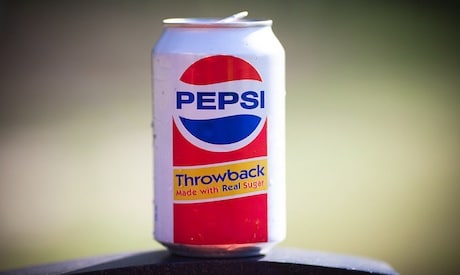
Oh, Big Soda, you never cease to amaze. Who doesn’t love all kinds of almost food ingredients from artificial colors and flavors to artificial sweetener and high fructose corn syrup? It's as if you've gone out of your way to find every chemical and goopy-bad-for-you-sludge and somehow turned it all into an addictive food-like product. With bubbles. But this news, well, it takes things to a whole new level.
According to Ad Age, "PepsiCo, in collaboration with San Diego-based biotech firm Senomyx, is in the late stages of developing a "taste modifier" that would essentially fool taste buds into thinking they are getting more sugar than delivered."
Sounds like a good thing, right? An ingredient that allows for less high fructose corn syrup and less too-many-related-illnesses-to-list artificial sweeteners? But Senomyx's "taste modifier"-better known as S617-hasn't even been approved by the FDA yet.
Oh, yeah, and what exactly is a taste modifier, anyway? Is it, you know, an ingredient that comes from food?
Read more about the Scary Seven ingredients to avoid
A stroll through the Senomyx website yields little information about this proprietary technology. "Senomyx has discovered or in-licensed many of the key receptors that mediate taste in humans," the website notes. "We created proprietary taste receptor-based assay systems that provide a biochemical or electronic readout when a flavor ingredient interacts with the receptor…As a result, we have identified hundreds of unique potential new flavor ingredients that could not be discovered using taste tests alone."
What we do know about tricking the brain into thinking it's getting something sweet, like artificial sweeteners do, is that it doesn’t work. You can't have your sugar-free cake and eat it too. But if you do eat it, your body won't know that sweetness isn't sugar. It'll trigger similar reactions to when you do eat sugar. Modifying biochemical reactions via taste modifiers could have similar effects on the brain. Recent research has found that the artificial sweetener sucralose may trigger diabetes. And an artificial sweetener is at least honestly sweet. Taste modifiers aren't even that–they're all jackal in fox clothing. You don't get anything but a bunch of weird signals to the body. One of which is surely "Drink More Soda."
And what's worse, the technology doesn't make soda healthier, it just offers Big Soda another tool to get you to drink more of it. There may be less HFCS or less aspartame, but it's still loaded with all the other bad-for-you ingredients.
Sales are slumping in both regular and diet soda categories as consumers are opting for healthier options, so it's no surprise they're looking for new ways of luring consumers in. How will they spin this one? "Tastes like the sweet stuff that tastes like the other sweet stuff you can't get enough of?"
Read more about what's now being linked with Splenda
Image: Sean Davis




